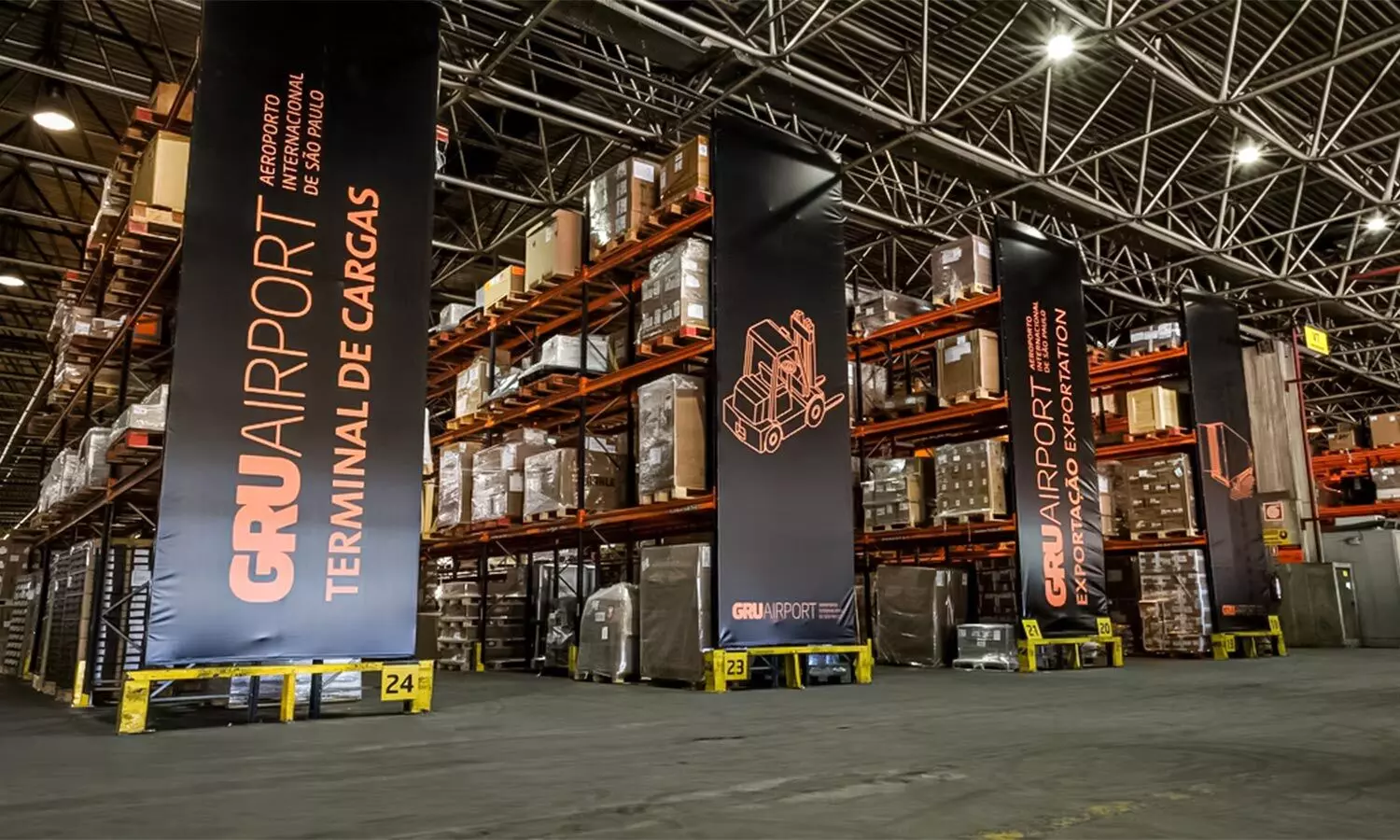Diogo Elias, Avianca cargo
According to data from Research and Markets, the e-commerce market in Latin America is projected to grow by 6.55% annually, reaching $194.7 billion in 2024. The report also notes that global companies are boosting their investments in regional markets to capitalise on the growing opportunities.
According to Xeneta’s report, the China-Latin America air cargo corridor is experiencing significant growth, largely driven by e-commerce. Air cargo spot rates from China to Latin America have more than doubled from May 2019 to May 2024. The China to Brazil route is particularly notable, with rates in May 2024 reaching $6.46 per kg, which is $1.60 per kg more expensive than the spot rate from China to the US.
“China’s supportive governmental policies, such as ‘Silk Road e-commerce’, have facilitated the rapid expansion of companies like Shein and AliExpress over the past year. These companies are now sending packages directly from warehouses in China to Brazil and Mexico,” the report mentions.
Shein is planning to expand by developing and constructing additional warehouses in Mexico over the medium term. Similarly, Chinese e-commerce companies Temu and TikTok are targeting market share in Latin America.
To meet the demands of the expanding e-commerce market, both cargo carriers and airports are actively enhancing their operations.
“We, as an airport, hold more than 90% of the total e-commerce shipments that arrive in Brazil. More than 30% of all the cargo that arrives at São Paulo International Airport (GRU) comes from Asia, mainly from e-commerce. So, it’s a huge segment for us to grow,” mentions Hugo Repolho, Head of Cargo, GRU Airport in an interview with the STAT Media. He also asserted that GRU aims to be a South American redistribution hub, particularly for e-commerce.

Image: GRU Airport
Cargo carriers such as Avianca Cargo are gearing up for e-commerce growth by expanding their fleets and establishing strategic partnerships.
“There has been a growing e-commerce trend from Asia to Latin America, and we are currently preparing for it with the additional arrival of our Airbus A330 P2F aircraft that will complement our fleet, offering increased capacity to Latin America. Furthermore, we are strengthening our partnerships with Asian airlines to enable us to participate in this expanding market. Some of these developments have occurred with Turkish Cargo, with whom we signed an MoU last year precisely to seek synergies that allow us to improve connectivity between Asia and Latin America, and with Cathay Pacific, with whom we have also been developing our cooperation to and from Asia, particularly via our main hubs, Hong Kong and Miami,” says Elias of Avianca Cargo.
“With increased capacity and alliances with strategic partners, we expect to diversify our product portfolio, participating in the e-commerce market from Asia, but also connecting Latin American products, such as Chilean salmon and Colombian/Ecuadorian flowers, with Asia.”
LATAM Cargo is optimising its network and technology to improve e-commerce delivery times.
“We are actively collaborating with major players in the domestic e-commerce sector, focusing on reducing lead times thanks to our expansive network. From a technological standpoint, we have implemented CROAMIS across our operations, which optimises routing for both cross-border and domestic shipments, enhancing delivery speed. Additionally, our integration of APIs with customer systems improves the shipping experience, providing real-time transparency and visibility into shipments throughout the entire process,” mentions Torres of LATAM Cargo.
“Moreover, by leveraging our combination of passenger capacity and B767-300 freighters, we boost our logistics capabilities during peak demand periods. This approach enables us to increase shipment capacity by up to 40%, ensuring timely deliveries and maximise operational efficiency,” he adds.
Despite its growth potential, the Latin American air cargo industry faces significant challenges, primarily due to infrastructure limitations. Many airports in the region lack modern cargo handling facilities, a study by ACI World and Oxford Economics has found that airports require $94 billion in investments through 2040 to accommodate the increasing demand for air travel in the Latin American region. This total includes $41 billion for new greenfield projects. leading to inefficiencies and delays. The inadequate cold chain infrastructure is particularly problematic for a region that heavily exports perishables. However, progress is being made to address these challenges.
 “We, as an airport, hold more than 90% of the total e-commerce shipments that arrive in Brazil.”
“We, as an airport, hold more than 90% of the total e-commerce shipments that arrive in Brazil.”
Hugo Repolho, GRU Airport
Xeneta’s report highlights that the growth in e-commerce is putting pressure on air cargo capacity. Given the long distances involved, most air cargo from China to Latin America moves on multi-stop flights via other regions, such as North America, Europe, or the Middle East. This complex routing, combined with ongoing disruptions in the Red Sea and the slow recovery of belly capacity between China and North America, is constraining capacity between China and Latin America.
“Last year, we invested close to $9 million to enhance our cold storage facilities at our strategic hub at Miami International Airport (MIA). This investment underscores our commitment to delivering superior cold chain services. MIA serves as a critical connection point between North and South America, as well as a gateway to Europe and Asia. Our facilities at MIA include the largest warehouse and the most extensive cold storage areas at the airport, enabling us to uphold the highest standards for the perishable goods we transport,” says Torres of LATAM Cargo.
Economic volatility in the region adds another layer of complexity. Latin American economies are often subject to currency fluctuations and inflationary pressures, which can impact the stability of air cargo operations. The fluctuation of fuel prices, a significant operational cost for air cargo companies, further compounds this economic uncertainty. Political changes and policy shifts in various countries can also create an unpredictable business environment, making long-term planning and investment decisions challenging for air cargo companies.
“Regarding rising fuel costs, our priority is cost efficiency to be able to compete and be sustainable in the long term. In this sense, our A330 fleet, the medium-sized cargo fleet with lower environmental impact based on the region, is more fuel efficient than its counterpart, it has better volume payload and volume capacity than other medium-size wide-body aircraft while still allowing for flexibility in medium-range routes,” explains Elias of Avianca Cargo.
“LATAM Cargo is effectively addressing the challenges of rising fuel costs, economic fluctuations, and geopolitical uncertainties through a strategic focus on cost efficiency, revenue diversification, and fleet adaptability. Our flexible operating model allows us to quickly adapt to various market conditions, supported by our four operational certificates for the B767-300 freighters in South America, which enable high aircraft utilisation. Additionally, our choice of the B767-300 freighter reflects our commitment to using the right-sized aircraft for specific regions, ensuring both adaptability and efficiency amid changing economic landscapes,” states Torres of LATAM Cargo on these issues.
Latin America’s air cargo market is at a crossroads, balancing robust growth opportunities with significant challenges. Rich in resources and expanding in e-commerce, the region shows promise. However, infrastructure limitations and economic volatility pose obstacles. As industry leaders adapt and invest strategically, Latin America’s air cargo sector is set to play an increasingly crucial role in global trade.
Source link : http://www.bing.com/news/apiclick.aspx?ref=FexRss&aid=&tid=66b20c604a17484bab612b47509c2a1a&url=https%3A%2F%2Fwww.stattimes.com%2Fair-cargo%2Fair-cargo-in-latin-america-rising-amidst-rich-resources-and-real-challenges-1352899&c=10662891149843659119&mkt=en-us
Author :
Publish date : 2024-08-06 00:30:00
Copyright for syndicated content belongs to the linked Source.












